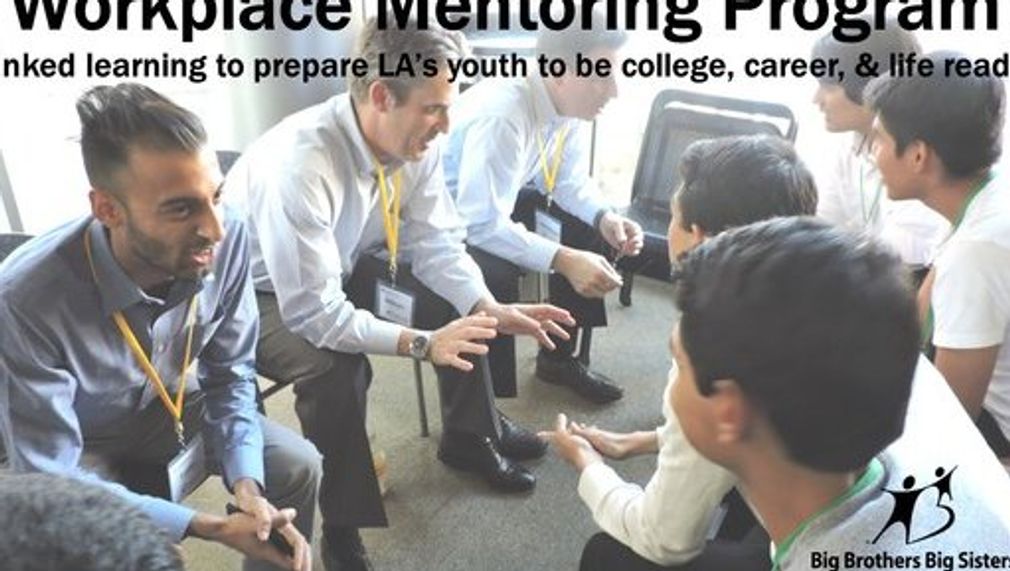Linked Learning: College Work & Life Ready Through BBBSLAs Workplace Mentoring Program
In a world that is becoming increasingly automated & online, one of the most radical & innovative things you can do is to return to the basics to unleash the potential in real human to human interaction. Most people can identify an adult from their childhood who served as their guide and "showed us the ropes" - a mentor. BBBSLA wants to connect our city's vulnerable youth to qualified mentors through our programs, which have been proven to measurably improve learning and academic outcomes.

In what areas of Los Angeles will you be directly working?
Central LA
East LA
San Gabriel Valley
San Fernando Valley
South LA
Westside
South Bay
Antelope Valley
County of Los Angeles
How do you plan to use these resources to make change?
Engage residents and stakeholders
Expand a pilot or a program
Mobilize for systems change
Advocate with policymakers and leaders
Implement and track policy
How will your proposal improve the following LEARN metrics?
Youth unemployment and underemployment
District-wide graduation rates
College matriculation rates
Student education pipeline (an integrated network of pre-schools, K-12 institutions, and higher education systems that prepares students for seamless transitions between high school, higher ed
Suspension and expulsion rates (Dream Metric)
Truancy rates in elementary and middle schools (Dream Metric)
Students perceived sense of safety at and on the way to school (Dream Metric)
Describe in greater detail how you will make LA the best place to LEARN.
In 2014, BBBSLA achieved a 96% high school graduation rate and 94% of graduates are college bound in a cohort that is 100% youth of color from some of LA's most under-resourced regions. We know that nothing can serve as a substitute for the transformative impact of one-to-one mentoring in the life of a young Angeleno whose potential can be activated by a caring mentor.
Ensuring the continued success of our youth depends increasingly on the availability of "linked learning" opportunities, which is education that encourages academic success while introducing work-based learning to help youth envision a school-to-career pipeline. BBBSLA's Workplace Mentoring Program links high school juniors and seniors to mentors in some of LA's most influential corporations. Students are transported from their high school's to their Workplace Program Sites to participate in a two hour session that begins with a facilitated session led by our BBBSLA team focused on college and career readiness, as well as life skills learning, and concludes with one-to-one time with their mentors. The program is more than a "career exploration day" as it spans an entire school year.
BBBSLA's Workplace Mentoring Program transforms our city into a "learning lab" for youth curated by professionals who want to help our young Angelenos see their own potential as well as the potential in our city. In this way, learning happens while helping Angelenos connect more deeply to each other and to where we work and live.
Please explain how you will evaluate your work.
As the only national youth mentoring program with evidence-based outcomes, Big Brothers Big Sisters measures the impact for the majority of the Little Brothers and Little Sisters we serve through our Youth Outcomes Survey (YOS). Careful analysis of the survey results allows the agency to be accountable for each youth we serve and nurture their success. During the length of a match, our case management team utilizes the Strength of Relationship (SOR) survey to evaluate the development of the relationship between the Big and Little.
Additionally, BBBSLA is currently tracking high school graduation rates and college admissions rates, which are broken down to detailed demographic information, including by each Service Planning Area (SPA) in Los Angeles County. This data allows us to see where we are having the most impact. In 2014, the largest share of our college bound students came from South Los Angeles and South Bay regions (SPA 6 & 8).
How can the LA2050 community and other stakeholders help your proposal succeed
Money (financial capital)
Volunteers/staff (human capital)
Publicity/awareness (social capital)
Community outreach
Network/relationship support